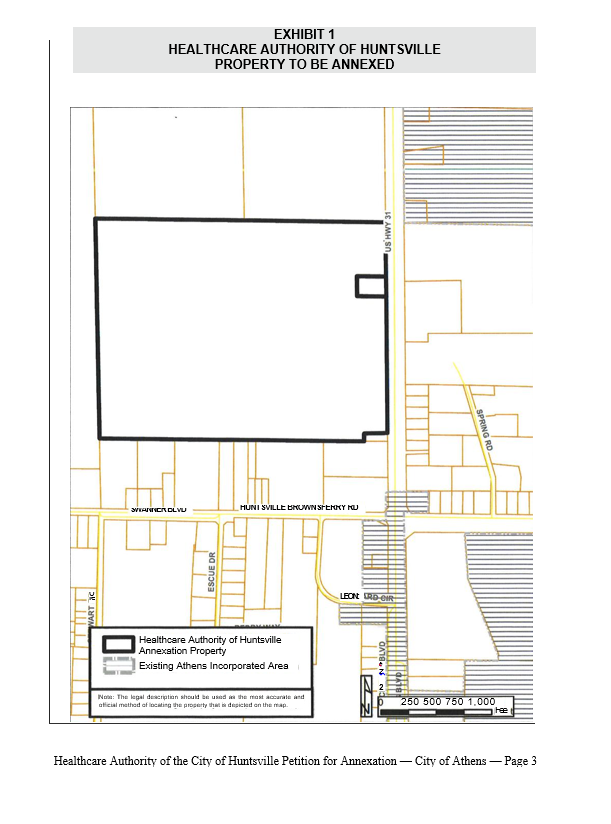Ex-officer’s lawsuit against APD dismissed
Published 6:30 am Friday, November 10, 2017
A federal judge has ruled against a former Athens police sergeant who claimed in a 2014 lawsuit that corruption within the department led to his firing in 2012.
In his lawsuit — filed against Athens Mayor Ronnie Marks, Police Chief Floyd Johnson, Capt. Tracy Harrison, former Police Chief Wayne Harper and Capt. Trevor Harris — former Sgt. Jason White claimed, among other things, Harrison and another officer used a police vehicle to pull over a mail truck so Harrison could intercept, retrieve and destroy documents about another man’s arrest for driving under the influence of alcohol before it arrived at the Alabama Department of Public Safety.
Trending
White claimed the defendants retaliated against him for speaking out against corruption within the department. He also contended the defendants’ conduct violated his rights under the First Amendment. Meanwhile, the defendants asked the court to decide in their favor.
U.S. District Judge Madeline Hughes Haikala issued a summary judgment — a judgment without a full trial — against White and in favor of the defendants. Her 16-page opinion, available online, is based on police testimony and documents. Below are the key points cited in the case, according to her ruling:
How judge sees case
APD has two divisions: patrol officers and investigators. White began his career with the department as a patrol officer in 1999, rose to the rank of sergeant in 2005 and became a detective sergeant in the investigations division in 2007.
White and at least one other investigator became concerned some of the senior officers at APD might be engaged in misconduct. For example, while White was a narcotics investigator, a number of confidential informants report they had been “burned” (exposed as informants to drug dealers) by someone with APD whom the informants called “Downtown.” White deduced “Downtown” had to be a captain within the department. White and his partner, Officer Greg Parnell, reported the situation to Drug Enforcement Administration agents in Huntsville.
Mail truck chase
Trending
In her opinion, the judge said another incident prompted White and another investigator, Detective Dustin Lansford, to take action. A young officer, Jason Threet, conducted a traffic stop and arrested the driver, William Jeffers, because he suspected Jeffers was intoxicated. Threet brought Jeffers to the precinct and completed a report in which he indicated Jeffers should be charged with DUI. Copies of all such reports must be mailed to the Department of Public Safety in Montgomery. Threet placed the DUI report in the mail.
A criminal defense lawyer in Athens called Harrison about the arrest. The lawyer had represented Harrison’s son in a criminal matter but had not charged Harrison for the services. The lawyer asked Harrison for help with the DUI case. Harrison approached Threet about the matter, and Threet agreed to drop the case. When Harrison learned Threet had already placed the DUI report in the mail, Harrison and Lt. Anthony Pressnell got in a marked police car, pulled over the mail truck carrying the report and retrieved the report from the mail carrier. The report no longer exists.
Clerk reports incident
The Police Department’s records clerk told Lansford about the incident. The clerk said Harrison had erased the entry in the clerk’s log pertaining to the DUI arrest. Lansford reported the situation to the Alabama Attorney General. The AG sent a team of investigators to APD to investigate the report. White noticed the investigators around the department and asked Lansford what they were investigating. Lansford told White of Harrison’s efforts to erase the records of Jeffers’ DUI arrest.
White discussed the DUI incident with Holly Hollman, who was then a local newspaper reporter. White shared the information because Lansford had told him the AG’s Office was dropping its investigation and White did not want it “swept under the rug.” In providing information to a reporter about an internal police matter, White violated the department’s policy prohibiting communication about confidential police business. White acted in the hopes a full investigation would cause the corruption in APD to stop.
Outcome
Ultimately, APD reinstated the DUI charges and reprimanded Harrison and Threet. Harrison does not believe he deserved the reprimand he received for his efforts to help Jeffers avoid the DUI charge. Rather, he believes the person who told the press about the handling of the DUI bore responsibility for the embarrassment the situation brought to the department.
Following the investigations of the DUI incident, “a lot of things happened” that made work at APD “miserable” for White and Lansford, according to the judge’s order. Lansford thought about taking a different job to get away from the department. Harper removed White as supervisor of the department’s honor guard and replaced him with Harris, who at the time “was not part of the honor guard.” White stepped down from the honor guard. Harper also moved White from investigations to patrol. White believes these actions were retaliatory because his supervisory role in the honor guard was of great personal importance to him, and his transfer from investigations to patrol resulted in diminished on-call pay. White believes his superior officers suspected he had spoke to Hollman about the involvement of APD officers in Jeffers’ DUI incident.
Termination
On May 1, 2012, White was fired. He asserts this was a final act of retaliation against him for exposing corruption within the department.
In contrast, the defendants claim White’s suspension from the Alabama Criminal Justice Information Center, or ACJIC, database was the actual reason the department chose to terminate him. ACJIC is a state-run law enforcement agency that maintains data for use by law enforcement agencies and police departments in Alabama. In April 2012, White lost his privilege to use the database after an investigation by ACJIC determined he had used the system for unauthorized purposes. In April 2011, White’s ex-wife, Sheree Wisdom, had complained to APD that White had been using his database to investigate her, her then-husband and their friends. Harrison, Harris and Harper were present when Wisdom made her complaint about White’s conduct. Wisdom acknowledges that while she was at the station, she discussed Hollman with the defendants. Wisdom claims she brought up White’s connection to Hollman and that this brief exchange occurred after she had discussed her complaint.
Investigation
Both the APD and the ACJIC investigated Wisdom’s allegations against White. The ACJIC determined White’s use of the database was unauthorized. As a penalty, ACJIC suspended White’s use of the database for six months and restricted his access for six more months. After APD was notified of the suspension, then-Chief Johnson recommended White’s firing. The mayor approved the decision. White appealed the decision, but the City Council accepted the recommendation of the mayor and the chief.
White claims his termination was not a necessary consequence of his his ACJIC suspension. He believes he could have continued to serve as an evidence technician or a crime scene investigator, though he admits neither position formally existed within the department. Harrison said ACJIC was a job requirement for all police officers. Marks testified the city had no available alternative positions fitting White’s qualifications when the city fired him.
White contends other APD officers used the ACJIC database for unauthorized purposes but the department did not impose similar sanctions. White acknowledged he cannot identify an instance in which a similar misuse resulted in a report of misconduct or a suspension from the database.
White also asserts officers who had committed other serious offenses faced less serious penalties than he faced. Officers Pressnell and Threet, who were involved in Jeffers’ DUI incident, have been promoted. Taken together, White believes these facts indicate the real reason for his termination was not his ACJIC suspension but his conversations with a reporter.
The decision
The court determined White’s First Amendment retaliation claim was not sufficiently clear at the time of the defendants’ alleged misconduct to give the defendants fair warning that what they were doing violated his constitutional rights. The court said White made no showing that the Police Department did not have a legitimate interest in prohibiting the discussion of confidential police business. The court said to hold the city liable for the actions of its officials, White had to show that his rights were violated, that the city had a custom or policy that constituted deliberate indifference to that constitutional right and that the policy or custom caused the violation. The court also said the city provided undisputed evidence that the decision by Johnson to recommend White’s firing and the mayor’s decision to approve it were subject to final review by the City Council. Therefore, White’s suit did not identify the city officials who speak with final policymaking authority for the city.





